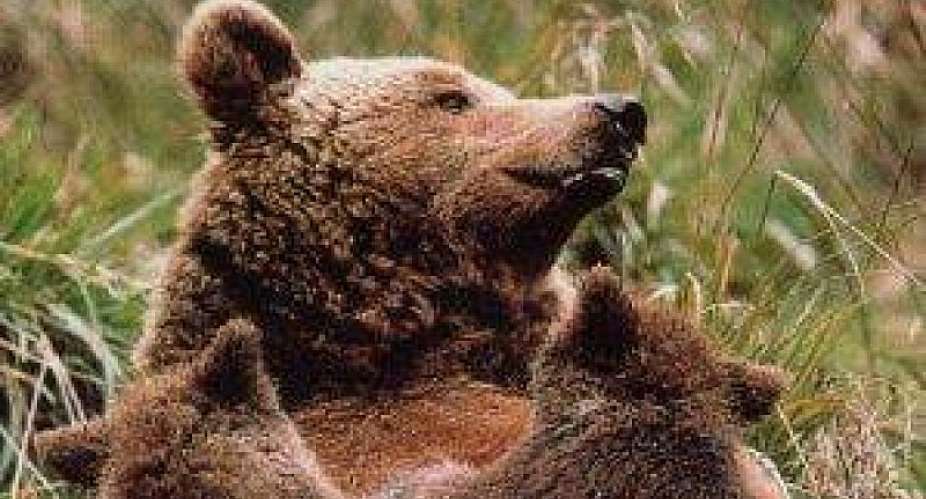French farmers in the Pyrenees mountains blame brown bears for a spike in attacks on sheep in an ongoing dispute over the efforts to bring the animals back into the wild.
For the past 20 years, France's government has been gradually reintroducing brown bears to the Pyrenees mountain range on the country's southern border with Spain.
Hunted to the brink of extinction, only half a dozen bears remained in the mountains in the mid-1990s, but subsequent efforts to boost their population, mostly by relocating them from Slovenia, have seen their numbers grow to an estimated 45 today.
But reintroductions have long met with resistance among farmers in a standoff known in the region as the “bear wars”, which resemble tensions over the reappearance of wolves elsewhere in the country.
“The situation gets worse from one year to another, and it's worsened exponentially the past two years,” says Olivier Maurin, a sheep farmer who heads a campaign calling for the bears to be taken out of the mountains.
Rise in bear reports
Protests increased as two new bears were brought to the Pyrenees in 2018, with at least 1,200 people rallying in the city of Pau and some 200 protesters blocking roads during the reintroduction.
More recently, a spike in reported incidents prompted some 100 mayors and other officials to rally outside state buildings in Toulouse last Tuesday.
Official figures in the French department of Ariege, where opposition to bears in among the strongest, show the number of requests for compensation for suspected bear attacks nearly doubled between 2017 and 2018.
The number of sheep fatalities with a possible link to bears – mostly cases of livestock plummeting off cliffs after being spooked by the animals – has also more than doubled so far in 2019 over the same period the previous year.
“There's no longer any place for bears,” Henri Neyrou, a local councillor, told AFP agency at the demonstration. “We're going to have problems and I fear the worst.”
Efforts to coexist
But this logic puts opponents at odds with conservationists who argue that the situation is not as drastic as angry farmers make it appear.
“Many of [the reported incidents] are of undetermined cause, and a third are still being analysed,” says Jean-David Abel, vice-president of conservation group France Nature Environnement.
“If you take these figures and say they are potentially due to bears, it gives the impression of a sharp rise in incidents. If you look at what ends up being compensated due to bear attacks at the end of the year, you will see the rise is not so sharp. In other words, it's an attempt to blame bears for damages they are not responsible for.”
Likewise, the notion that bears should be removed entirely puts angry farmers at odds with the relocation efforts themselves, whose basic premise is that human and wildlife can, and have long been able to, coexist in the Pyrenees.
“Contrary to those who say the bear has no place in the Pyrenees, we think the bear fits perfectly from a biological and natural perspective, if man does not kill it,” Abel says.
Government offers compensation
The French government offers assistance and advice to farmers operating in areas where bears could appear, but opponents tend to strike down any measures short of removing the bears entirely.
They say compensation for attacks fails to cover the losses, subsidies for hiring extra shepherds does not take working hours and labour laws into consideration, and a recommendation to lock up sheep at night in electrified pens is unrealistic.
“Agriculture in the mountains is highly developed, and there is nowhere else in Europe or the world where so many active pastures coexist with predators,” Olivier Maurin says.
“We ask for the bears to be removed, and perhaps the recognition that this was done against the wishes of the local population, many environmental specialists and others.”
But where opponents see the imposition of an incompatible species from afar, supporters perceive a small but increasingly radicalised anti-bear movement that public officials could do more to address.
“The state could do more to communicate that while it's natural to help farmers, opposing bears does not justify using any argument or lie that comes to mind,” said Jean-David Abel.
“A society where the majority is in favour of protecting wildlife has to stand by its decisions, and public officials have to educate angry farmers on how to reconsider their own presence, without calling into question the presence of these animals.”
(with newswires)





 Whoever participated in the plunder of the state must be held accountable – Jane...
Whoever participated in the plunder of the state must be held accountable – Jane...
 A vote for John and Jane is a vote to pull Ghana from the precipice of destructi...
A vote for John and Jane is a vote to pull Ghana from the precipice of destructi...
 I’ll repay your abiding confidence with loyalty, understanding and a devotion to...
I’ll repay your abiding confidence with loyalty, understanding and a devotion to...
 ‘I’ve learnt deeply useful lessons for the future' — Serwaa Amihere breaks silen...
‘I’ve learnt deeply useful lessons for the future' — Serwaa Amihere breaks silen...
 I’m sorry for the embarrassment – Serwaa Amihere apologises for leaked sex video
I’m sorry for the embarrassment – Serwaa Amihere apologises for leaked sex video
 Dumsor: Matthew Opoku Prempeh not in charge of Energy sector – Minority
Dumsor: Matthew Opoku Prempeh not in charge of Energy sector – Minority
 Adu Boahen’s murder: Police arrest house help who was in possession of deceased’...
Adu Boahen’s murder: Police arrest house help who was in possession of deceased’...
 Akufo-Addo nominates Felicia Attipoe as Tema West MCE
Akufo-Addo nominates Felicia Attipoe as Tema West MCE
 Election 2024: I can't have someone I defeated twice as my successor – Akufo-Add...
Election 2024: I can't have someone I defeated twice as my successor – Akufo-Add...
